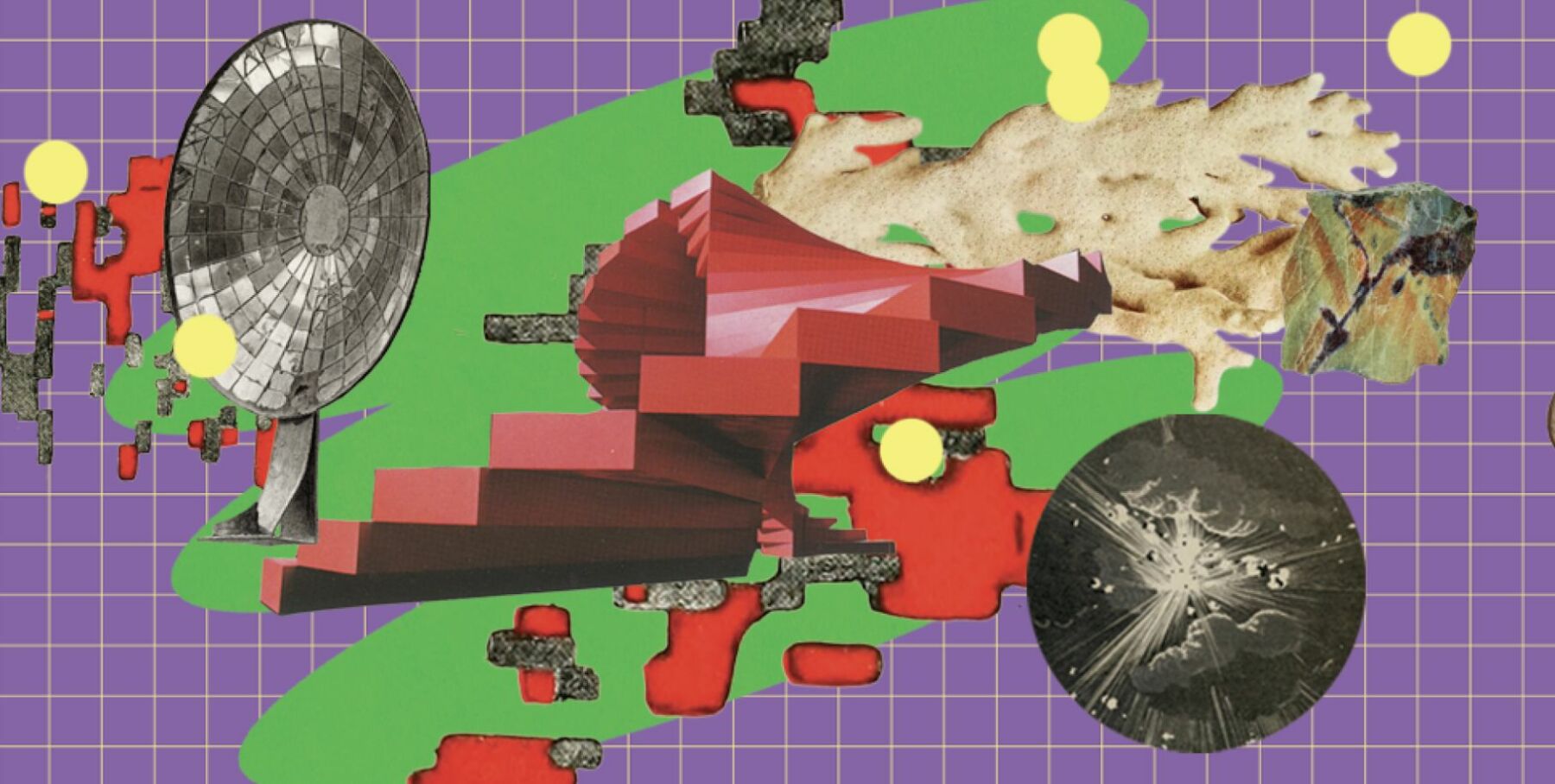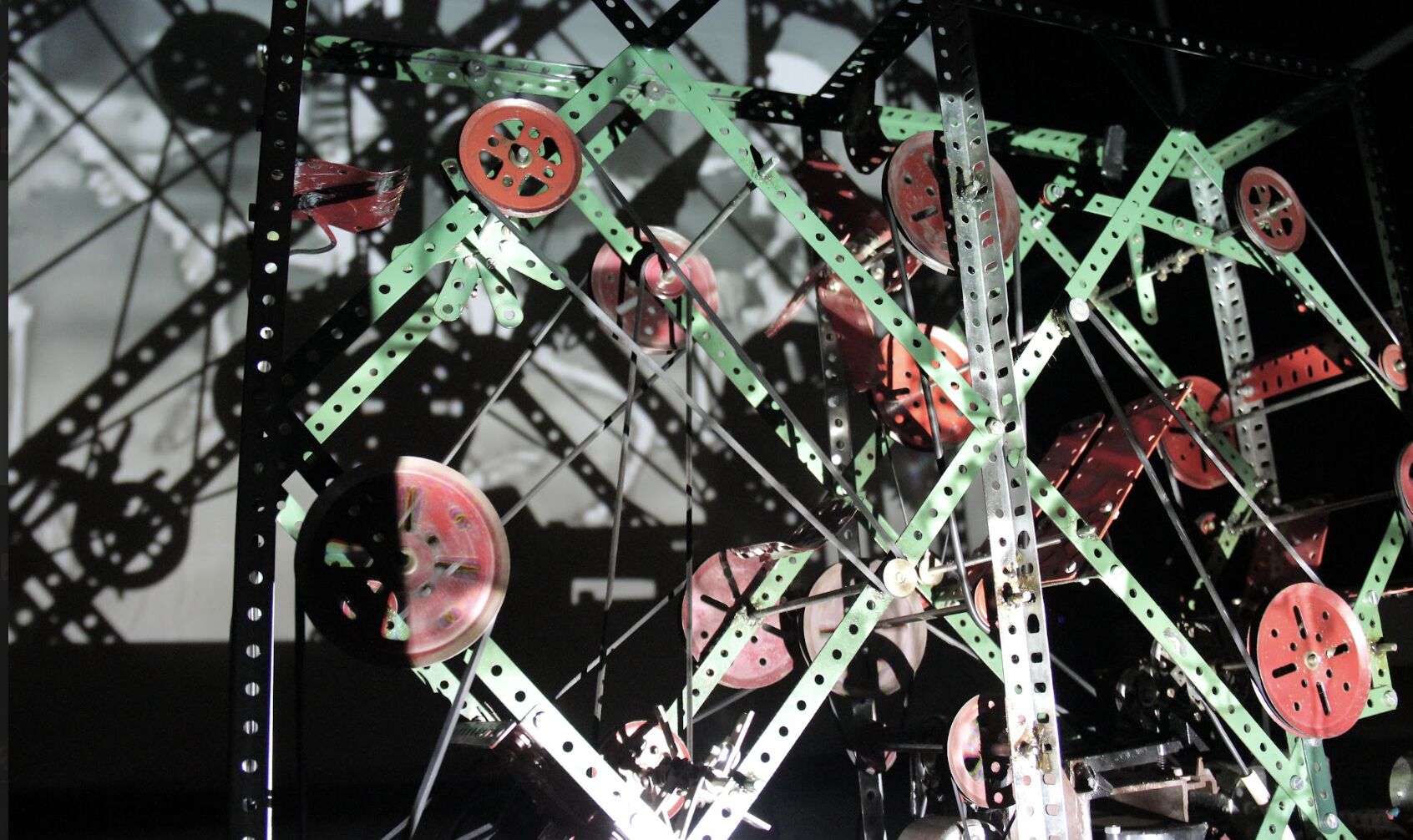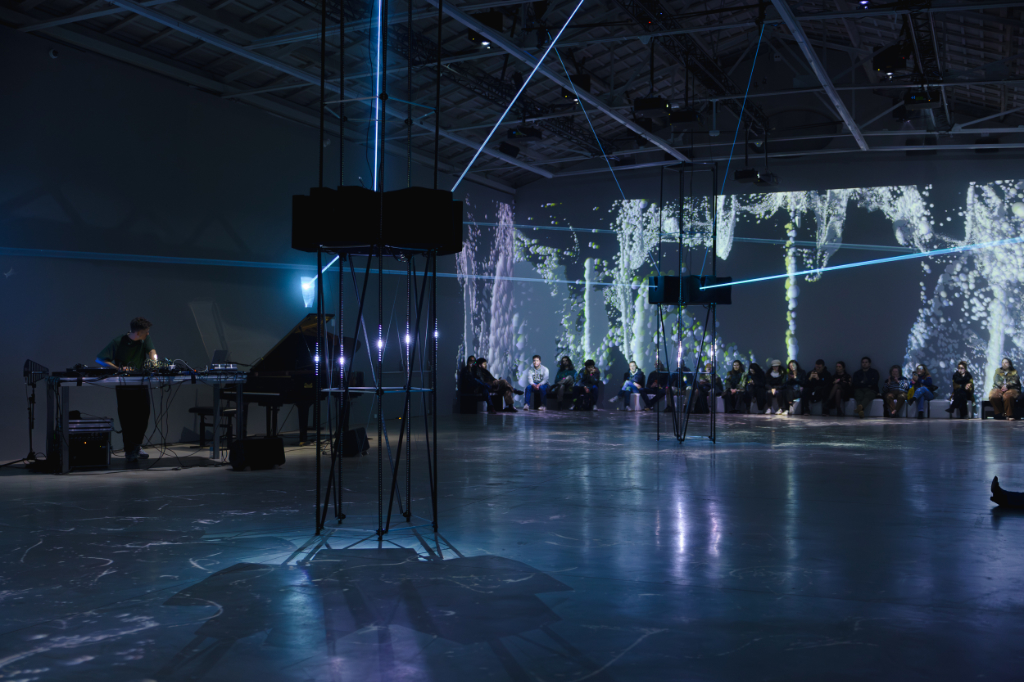Interview by Silvia Iacovcich
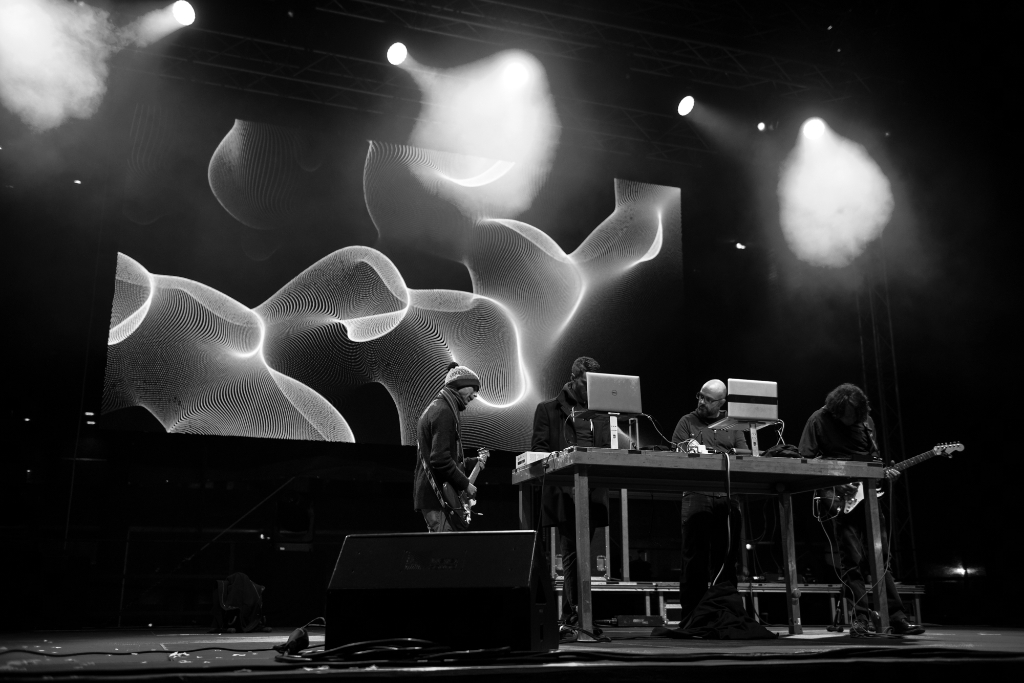
Despite the name, we can’t really say Island People are stuck in their haven. On the contrary, the modus operandi of the quartet (mastering engineer Conor Dalton, Grammy award-winning producer David Donaldson, musician and DJ Graeme Reedie “silicone soul”, and guitarist Ian Maclennan) is a stimulating and collective overflow of identities, exchanging roles and skills – a fluid operation whose ultimate sound is the outcome.
In that sense, Island People feels like a dynamic musical operation: meticulously sharing loops and beats for discussion and modification, the artists can take quite some incubation time to harvest the right modulation – in the case of Luna, one of their tracks that’s part of their second release, “II”, eight years was about the right time.
From their self-titled debut album in 2017 up to “II”, Island People crossed many venues and gigs, an essential step to understand their own identity while getting to know their crowd. The album shares the view of that period from its destitution: the sounds transfer the listener back to the past lockdown through a self-reflective journey that rotates around the concept of memory – existentialist and therapeutic.
While the artists constantly explore techniques and reverberations, the arrangements of the albums unfold slowly, framing time in an impression, conveying a feeling of an immediate future that seems to be stuck, a bitter perception we have all wrestled with recently. It all seems to emerge from an introspective matrix, particularly in “Loneliness has a purpose” or “Stillness” through their gloomy, reflective dark textures.
In “II”, the quartet experiments with visuals: the artists mention they have an eye for digital art and NFT, the development of AI in sound and vision art – often merging both forms – even if they assure us that sound comes first. This combination brilliantly translates in the accompanying video for “Crash”, provided by Scotland-based Swedish filmmaker and visual artist Helena Ohman, who also designed the album cover.
In the video, a glimpse of “what could be” transpires from a red background that veils the picture and never fades – making the travelling dimension look like a carbon copy of a journey with a blurred destination. We don’t know where we are headed: it could be the Scottish island landscape, a glimpse of our own memories, or a dream – the options are left mysteriously open.
Whether it is in the musical or visual experience, whether the music becomes a short film or not, this ambient, cinematic sound crafts landscapes and creates an image and action that takes root in your brain. Compared to the sound of Eclissi, an Antonioni classic that analyzes modernity and its discontents, the sound of Island People follows a similar magic that is always congruent.
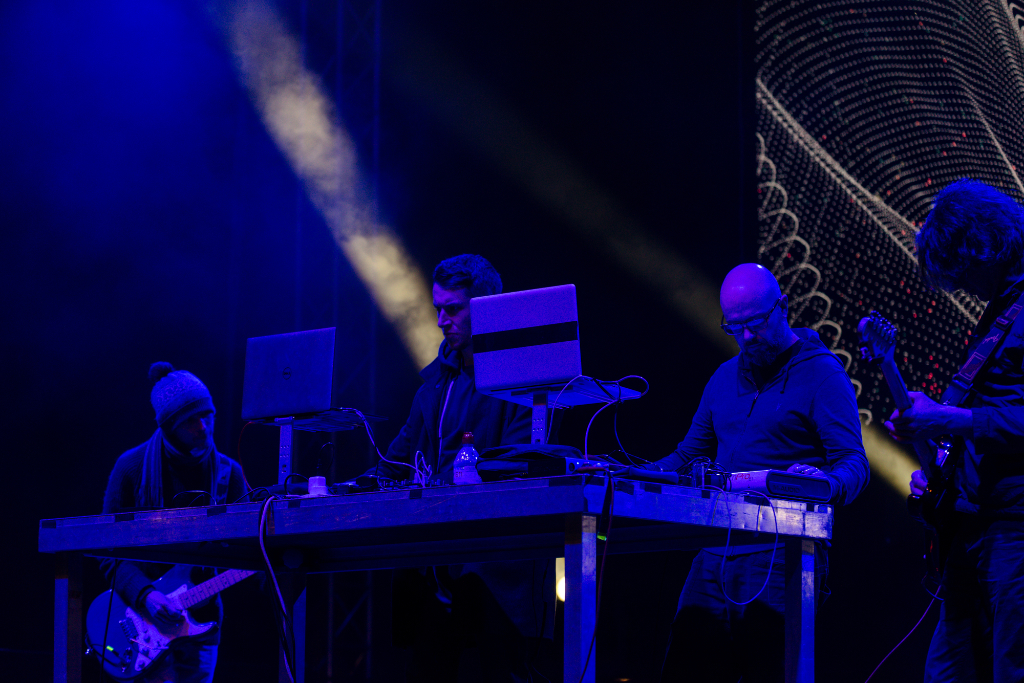
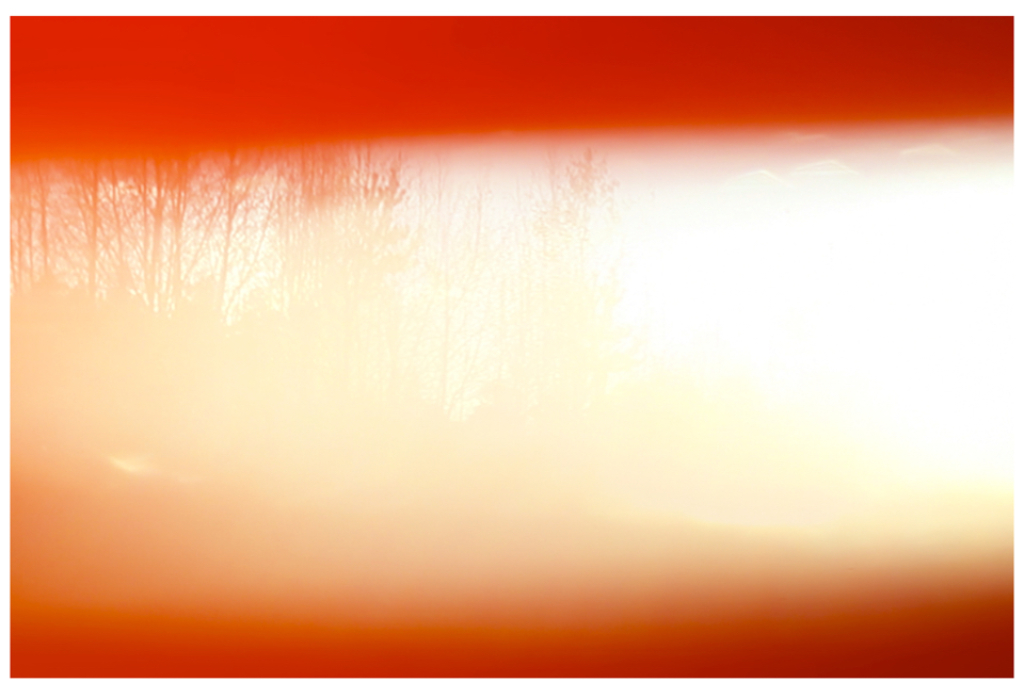
For our readers unfamiliar with your work, who is behind Island People and what does each member bring to the band regarding influences, ideas and experience?
Conor Dalton: We are pretty varied with our creative strategy; one or two members have made some band songs, whereas others involve all four people, and we tend to swap roles regularly. For example, if Dave creates most of the drums, then that leaves space for me to make pads; maybe Dave will mix something me and Graeme made or vice versa; when we have an idea, we make it happen, but we try not to have clearly defined roles set in stone.
David Donaldson: We started out trying to avoid the routine of our experience, Island People being a space where we could musically relax from the straight jackets of our careers. The most important feature of our working method is that no matter what gets passed on to the next person to work on, it will always come back improved.
Island People’s debut album was released in 2017. Now “II” is coming out: where has your sound taken you, and how has it evolved during these four years, from the inception of the first project until today?
CD: I feel a strong link exists between the first and second albums, but somehow this new album sounds more mature and rich. The pace and process were the same, we passed files back and forth between our studios, and we very slowly and patiently built up a folder full of loops and ideas; some got to be taken to completion, and others got to rest on the hard drive for years (for example Luna from the new album is 8+ years old)Then when one of us has an idea, we take the song, add to it, and pass it on. These things take time, and we like to make sure the songs stand the test of time by letting only our favourite songs be released that have been maturing for years.
DD: The main evolution was being allowed to play live at some incredible venues for me. This forced us to work out how to take a procedurally created album and reconstruct it meaningfully for performance. It also allowed us to work together and bond better as a band. It certainly doesn’t hurt to see how a crowd responds to what you do live!
Graeme Reedie: We understood how we could contribute to the music by playing live and rehearsing for the live shows. In this lp writing, the tunes became quite conversational through listening and responding to each other’s ideas. We had a much better sense of when to hand ideas in and how much space to leave each other. It kept things evolving and moving in varied and exciting directions for us.
The album reflects on destinations, journeys, and paths not taken/ended too soon – a great concept to explore during this past year of lockdown, traversing the ordinary during “non-ordinary times”. What was your intention, and what were the main challenges during the production?
CD: The lockdown provided plenty of time for self-reflection. We intended to create something that highlights how people can get stuck, looking backwards, looking forwards and fearing a potential future that never arrives, and struggling to escape the present while having to make peace with the story we have chosen to describe our life. The album celebrates the confusion that life’s many crossroads present to each person. Everyone has trauma, regret, and confusion in their way. This is a part of life that is inescapable, and for me, it was therapeutic to make peace with this in the form of this album.
DD: One of the biggest frustrations was having our time together physically cut short, having just started to enjoy working altogether as a band. It has to be said that as a group of people, the lockdowns probably impacted us less than most people in our day-to-day lives. We have worked long hours in small studios most of our lives. The exciting thing was seeing how everyone refocused their priorities and started seeing their local areas as essential and valuing them more – across the world. The mundane was given new respect and consideration.
GR: I think we were keen to capture the vibe we found when playing together as a band with this LP. The live aspect brought us to a lovely new place musically. We also wanted to go further with some of the techniques and processes we experimented with on the first lap.
The album has a very introspective matrix, almost like each one of you fused into the project creating a homogeneous sound, where themes and titles (as in “Loneliness has a Purpose” or “Stillness”) through their gloomy dark textures seem to be very inner-directed. How did you work on reaching this sort of intimacy through acoustic components, soundscapes and personalities?
CD: I think we are all introverted and isolated individuals in general, even before the pandemic. You could say that we had been training for years for the isolation that the lockdown brought. This will inevitably present itself in the music somehow, even though each band member is unique in their personality and taste. One of the reasons we chose the name Island People (aside from the fact we were all born on a lump of rock surrounded by ocean) was due to the feeling of being an outsider and being isolated, and having music that represents this feeling seems like a natural fit for us.
There is a strong affinity between sound and visuals throughout your collaborations, for example, with filmmaker Helena Ohman. How important is AV in your work?
CD: Increasingly, I have become passionate about painting and digital art since the first album release. As the explosion of the NFT marketplaces begins to develop, I can see a stronger bond between music and art developing, not to forget the development of artificial intelligence in sound and visual art. These things have excited me about the future, and I see innovation happening in real-time. We have created a few videos and trailers for the songs for Instagram, and Dave, and I have been experimenting with visual creations.
DD: I might have focused more on visual arts in my life, except for the fact most of my family are so much better at it than me! As with music, I’ve loved what technology has allowed me to do in this area. Given my work on films, where music is strictly tied to someone else’s art form, I find a true collaboration of music and visuals very rewarding.
GR: We were lucky to collaborate with some great visual artists during our live shows, and we’re all huge fans of certain movie soundtracks. The visual thing is something we’re enjoying and hoping to experiment with more as we continue. It was a great experience working with Helena on the crash video; it’s always fascinating to see visual artists respond to our music. Her films are beautiful. We’re hoping to do more of this in the future and perhaps will see what happens writing some music for a short film.
Your sound has been compared to an early Antonioni film – where “time stands still circling the moment” – into overlays of images and sounds. Does the ambient, experimental, cinematic sound come first, or do situations, and landscapes create an image and action, then translated into sound?
CD: Sound comes first. The visual side comes much later for me. I see them as totally separate until much later. Of course, it could also work the other way around, but somehow for me, this has not been explored personally. As we develop, I can see more and more development of the visual side of the band’s output.
DD: The music always leads the way. When it comes to mixing, I’m very visual in my approach. It’s something that feels like the next journey. Interestingly, after hearing the comparison to Antonioni’s work, I tried some of our albums played over L’Eclisse – they married nicely!
GR: So far, the music has come first, but I think we’d all be open to trying to write music to accompany the film.
What are your next projects going forward, and where shall we expect to see you live/online?
CD: I am mastering music 40+ hours a week and painting a lot. I also teach sound engineering at workshops at various schools like Berklee in Valencia. I will keep going in this direction and hopefully take some time off to travel and see some new places once the pandemic is under control.
DD: We’ve already started work on some new tracks, and it would be great if travel and live music were allowed again. I’m also working on some very personal pieces with some of Scotland’s finest classical players, and I’ve got involved with a project to build a professional soundstage here in Glasgow.
What’s the chief enemy of creativity?
CD: Here is a quote from Anne Lamott that perfectly answers this question better than I ever could “Perfectionism is the voice of the oppressor, the enemy of the people. It will keep you cramped and insane your whole life, and it is the main obstacle between you and a shitty first draft. I think perfectionism is based on the obsessive belief that you won’t have to die if you run carefully enough, hitting each stepping stone just right. But, unfortunately, the truth is that you will die anyway and that a lot of people who aren’t even looking at their feet will do a lot better than you and have a lot more fun while they’re doing it.”
DD: Agreed, give yourself a licence to fail. Also, phones.
You couldn’t live without…
CD: Internet, I am a digital guy. It’s my window to the world and to all the fantastic people I know in different places. It’s essential to my connectivity to my family, friends and colleagues.
DD: My work. My grandmother explained to me, “Work is different from a job; it will be the most honest relationship you ever have”. I would be lost without it.


